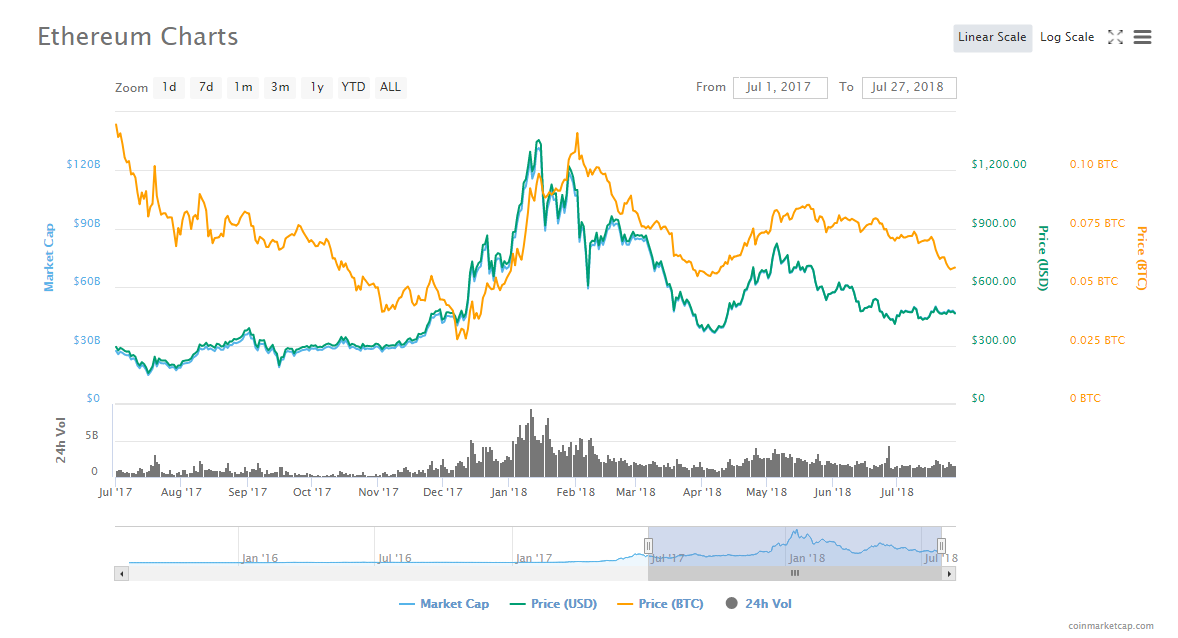
Launched in 2015, Ethereum is presently the second largest cryptocurrency in the world. Like other cryptocurrencies, it has also seen extreme volatility, with its prices plummeting by more than 36%.
The catch here, according to an article published on Forbes is that major cryptocurrency investors are of the opinion that it isn’t necessarily the lowest Ethereum can fall to, because of which they are belligerently betting against it.
New York City-based hedge fund, Tetras Capital is one of the foremost to advocate against Ethereum. Recently, the hedge fund announced that they would be taking a short position on Ether because their comprehensive analysis of cryptocurrencies led them to believe that the coins would tank significantly. Tetras Capital soon began shorting Ether in May when the price of Ether ranged between $572 and $659.
Timothy Young, an investor in crypto assets and blockchain is also an entrepreneur who sold his software startup, Socialcast to VMware for $100 million back in 2011. Young who also founded Hidden Hand Capital which has more than $100 million in crypto assets under management has decided on shorting Ether. Neural Capital is another hedge fund based in the Bay Area that has a short position on Ether. Young says:
“Ethereum has an incredible talent pool of developers. In the long term, I think they’ll solve a lot of scaling challenges. But in the short term, there’s a disconnect between the price and underlying technology.”
Ethereum has a market cap of $48 billion and a network that can handle about 15 transactions per second. Investors like Tetras Capital and Hidden Hand Capital feel that there is not enough volume for investors to bet on it.
In comparison, Visa is able to handle 24,000 transactions per second. This kind of a glaring contrast seems alarming for major investors. But it must be argued that Etheruem is a global platform whose focus is on developing decentralized apps on all their applications.
In the 41-page report regarding the reasoning behind Tetras’s decision on shorting Ether that was published last week Tetras stated that a centralized service such as the Amazon Web Services is about a million times less expensive when compared to an application call made on Ethereum.
Even as Ethereum developers claim that they’re working on various solutions to improve better network capacity, the Tetras team thinks that any sort of significant change will take a good amount of time to achieve. The founding partner of Tetras, Alex Sunnarborg says that when it comes to a store of value assets, bitcoin is the clear winner because of its:
“Crucial characteristics, including security, political and architectural centralization, monetary supply, regulation, and liquidity.”
The case for Ethereum investors
According to data received from New York-based law firm Foley and Lardner, a group of investors and business executives prefer Ethereum to cryptocurrencies like Bitcoin, Dash, and Monero. To them, Ethereum is their best bet with the safest invest opportunity.

While 38% of investors felt Ethereum was their best bet, 35% of the respondents picked Bitcoin. The co-founder of social news aggregator Reddit, Alexis Ohanian recommends investors to bet on Ethereum if they have any hopes of winning big.
There is also the fact that Ethereum has a huge corporate following. Last year saw a group of thirty banks, technology giants and other companies that formed the Enterprise Ethereum Alliance. The association includes big names like JPMorgan Chase & Co., Microsoft Corporation, Intel Corporation and several other Fortune 500 companies.
Other big-time investors don’t really have a decided stance regarding Ether. Kyle Samani, the managing partner of Multicoin Capital, a cryptocurrency fund that invests in tokens is considering shorting Ether but since he is already betting on XRP and Litecoin, he doesn’t want to add Ether to the list.
The Chief Strategy Officer of CoinShares, Meltem Demirors, a crypto investor is also on the fence about Ether. She thinks that Ether is not anywhere near a bull market but is also of the opinion that the demand for Ethereum based tokens and applications is entirely speculative.

